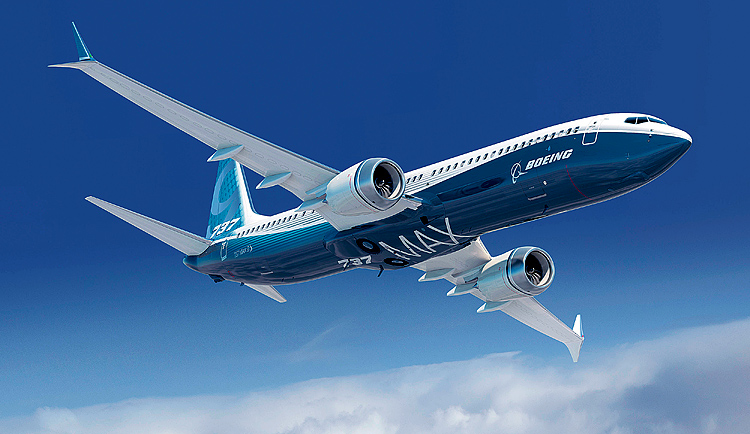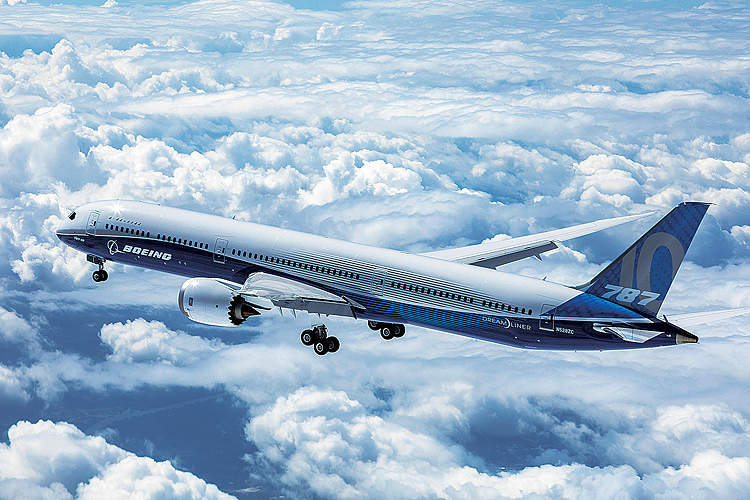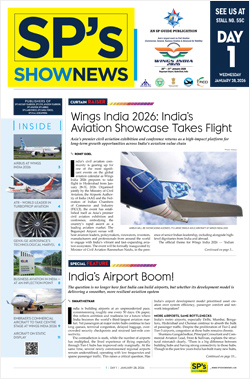Fostering Collaborations, Driving Innovation and Expanding Capabilities
Ryan Weir, Vice President of Commercial Sales and Marketing for India & South Asia, Boeing Commercial Airplanes talks to SP's ShowNews

SP's ShowNews (SP's): India's aviation growth trajectory suggests an unprecedented need for capacity over the next two decades. How is Boeing preparing to meet this demand, mainly through aircraft sales and localised manufacturing efforts?
Ryan Weir (Weir): Boeing is by far the largest foreign OEM in terms of sourcing from India. Boeing's sourcing from India stands over $1.25 billion annually, 70 per cent of it from manufacturing, through its large and growing network of 300+ supplier partners that are an integral part of our global supply base. These Indian companies are manufacturing and exporting systems and components for some of Boeing's most advanced products from India to the world. Over 25 per cent of our suppliers from India are Micro, Small & Medium Enterprises (MSMEs).
We have a dedicated and fast-growing supply chain team based in India that focuses on the development of new suppliers, including MSMEs. This effort has been pivotal in the growth of our network, which is propelled by significant advancements in quality and capability along the value curve. Our suppliers are transitioning from simple assemblies to more complex ones, including advanced materials like composites and thermoplastics, and employing technologies such as full-size determinant assembly (FSDA) and robotics. To meet the needs of India's rapidly growing aviation sector, Boeing's focus is on building the necessary capabilities in design, production, certification, and MRO support. As the market evolves, we continue to assess the feasibility of co-development and co-production opportunities, ensuring we have the robust ecosystem to support them. Some of the examples below highlight the capabilities of our Indian supplier partners to deliver critical components for Boeing platforms worldwide.

- Tata Advanced Systems Limited (TASL) manufactures complex floor beams for the 787-8, 9 and 10 Dreamliners. Boeing has awarded a follow-on contract to TASL, which has already delivered more than 33,000 beams.
- Mahindra Aerostructures Pvt Ltd (MASPL) has been awarded a contract for manufacturing and supply of the Boeing 737 inlet outer barrel components and sub-assemblies, the legendary single-aisle family of airplanes, at the state-of-the-art MASPL facility in Narsapura, near Bengaluru, India.
- Wipro Infrastructure Engineering's aerospace business unit manufactured and delivered strut assemblies for 737 MAX and next-generation 737 airplane programmes.
- Bharat Forge manufactures a range of titanium-forged parts such as flap-track forgings for the next generation 737 and forgings for the 737 MAX and the 777X.
- Hyderabad-based Cyient continues to support a number of critical design-engineering projects for Boeing airplanes and currently provides design and stress support on the 747-8 Freighter and the 787.
- Boeing has awarded a contract to Motherson Sumi Systems Limited (MSSL) to manufacture and supply aftermarket molded polymer parts for commercial airplane interiors.
- Bengaluru-based SASMOS HET Technologies has signed a manufacturing contract with Boeing Commercial Airplanes (BCA) to supply Electrical panels, Shelf Assemblies and Electrical wiring systems for Boeing 767 and 767-2C aircraft.
- Tata Boeing Aerospace Limited (TBAL), our JV with Tata Advanced Systems Limited (TASL), is manufacturing complex vertical fin structures for the 737 family of airplanes – a significant milestone for the joint venture.
SP's: Workforce development remains critical for India's expanding aviation industry. What new programmes or collaborations is Boeing introducing to upskill professionals and cultivate future aviation leaders in India?
Weir: The growing demand in India's aviation sector as the third-largest aviation market globally, creates a critical need for skilled pilots, technicians, and industry leaders. With an eight-decade-long heritage, Boeing continues to invest in helping build a highly skilled and efficient workforce that contributes to both the growth of the aerospace and defence sector and the country's economic progress. We have been working with our partners on various skill development programmes that span the breadth of the aerospace industry.
Through programmes such as "Kaushal," a Boeing India supply chain initiative for skill development, Boeing partners with the industry to train people from disadvantaged backgrounds, including women and those differently abled, to become part of the mainstream aerospace manufacturing industry. Last year, Boeing announced a $100 million investment in infrastructure and training programmes in India to meet the rising demand for pilots driven by India's growing aviation sector. The Boeing Sukanya Program will further foster women's participation in the aviation sector.

In 2022, Boeing collaborated with Indira Gandhi Rashtriya Uran Akademi (IGRUA), a premier flight training organisation under the Indian Ministry of Civil Aviation (MoCA), for opportunities to enhance safety and quality in early career flight training. It is an important step in advancing aviation training in the country through collaboration with flight training and development organisations to enhance capabilities and safety. Boeing has partnered with Air India, Tata, Micro, Small, and Medium Enterprises (MSMEs) such as Rossell Techsys, SASMOS, Jaivel, and other industrial partners like Indo MIM, Lakshmi Machine Works, Air Works, and Wipro to offer training opportunities for pilots, aircraft maintenance engineers, technicians, and frontline factory workers across India. To date, nearly 4,000 workers have benefited from these initiatives.
In addition, Boeing organises the annual Boeing-IIT National Aeromodelling Competition at engineering colleges, where participants receive training to design and build airplane models, fostering careers in aerospace. Through the Boeing University Innovation Leadership Development (BUILD) programme, Boeing collaborates with incubators, including IITs and IISc Bangalore, to mentor university graduates and early-stage startups, helping them gain visibility among investors. Boeing also partners with not-for-profits such as the Learning Links Foundation (LLF) to develop a skilled and employable workforce for the aerospace manufacturing sector.
SP's: With the rise of low-cost carriers and regional connectivity schemes in India, how does Boeing plan to cater to these airlines' unique needs?
Weir: As low-cost carriers (LCCs) and regional connectivity schemes continue to expand in India, Boeing is focused on meeting their unique needs with strategically designed solutions that prioritise operational efficiency, fuel economy, and reliability. The 737 MAX family, known for its fuel efficiency and operational versatility, is especially suited for India's price-sensitive market. The 737 MAX 8 and the higher-capacity MAX 8-200 models offer reduced operating costs per seat, aligning with the business models of LCCs aiming to maintain low fares while ensuring profitability. Additionally, the 737 MAX 10 variant, with its increased seating capacity, caters to high-density routes commonly operated by Indian LCCs. For instance, Akasa Air has placed orders for the 737 MAX 10.
India's Regional Connectivity Scheme, UDAN ("Ude Desh ka Aam Nagrik"), aims to enhance air travel accessibility by connecting underserved airports. Boeing's aircraft portfolio, including the 737 series, is well-suited for these regional operations, offering the range and performance necessary for efficient service on shorter routes. Our strong partnerships with Indian carriers, such as Akasa Air, Air India, and SpiceJet, highlight our commitment to supporting the growth of India's LCC market. Air India's historic order for up to 290 Boeing jets, including 190 737 MAXs, and Akasa Air's order of 226 737 MAX airplanes reflect our role in supporting India's growing aviation sector. Boeing also provides comprehensive lifecycle support services, including pilot and technician training and digital solutions, to optimize airline operations.
Through our tailored solutions and strategic engagements, we are well-positioned to support the evolving needs of India's low-cost carriers and regional connectivity programmes, contributing to the development of the nation's aviation infrastructure. Boeing's support extends beyond aircraft delivery, offering maintenance, training, and in-country services to ensure sustained operations and growth. This approach enables airlines to remain competitive and thrive in the dynamic Indian aviation market while maintaining operational excellence.
SP's: What can we expect from Boeing at Aero India 2025?
Weir: We are excited to be at Aero India 2025 and will continue to highlight Boeing's investments in India to build an integrated aerospace ecosystem. Our focus will be on demonstrating how Boeing is fostering collaboration across civil aviation, defence, urban air mobility, and MRO sectors to drive innovation, optimise resources, and expand manufacturing capabilities. By strengthening these connections, we aim to position India as a global aerospace hub, addressing both military and civilian aviation needs with cutting-edge technologies and solutions. Through this integrated approach, we are committed to supporting India's growth and competitiveness in the global aerospace market.





